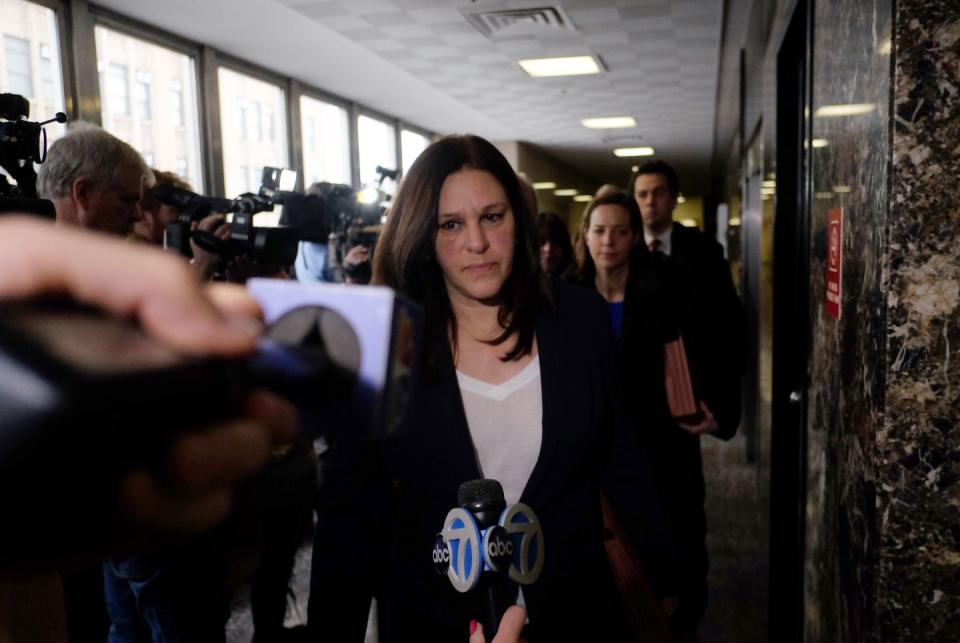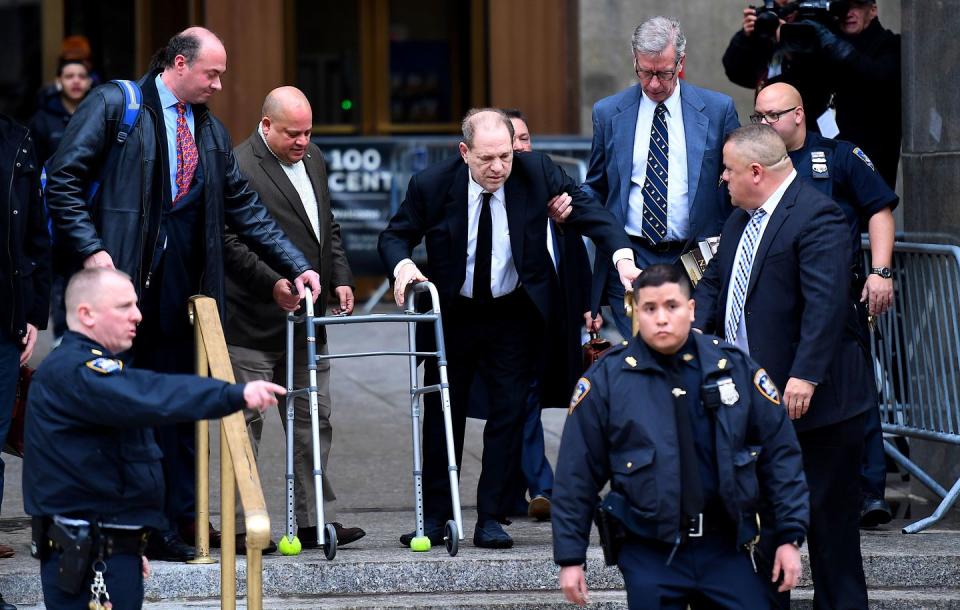Harvey Weinstein Is Sentenced to 23 Years in Prison for Assault and Rape Charges

Two years after dozens of women bravely came forward with accusations of sexual assault and rape against Harvey Weinstein, he was sentenced today to 23 years in prison.
Jurors in his Manhattan trial found him guilty last month of a felony sex crime and rape but acquitted him of predatory sexual assault, the top two charges against him.
The disgraced Hollywood mogul was accused of misconduct by more than 80 women since the New York Times and the New Yorker published explosive reports detailing decades of sexual harassment, assault, and rape allegations two years ago. The stories reignited the #MeToo movement (first founded by Tarana Burke in 2006) to expose predatory men in power and led to the formation of Time’s Up. In Manhattan, Weinstein faced five felony charges based on claims by two of those women. He pleaded not guilty and denied any nonconsensual sex.
According to Variety, Weinstein was found guilty of criminal sexual act and third-degree rape on Monday after six women testified that he sexually assaulted them. He was reportedly acquitted of other charges. Last week, jurors were deadlocked on two counts of predatory sexual assault, the most serious against him, three days after beginning deliberations. Justice James Burke reportedly instructed jurors to come to a unanimous decision on those two counts, so that deliberations could continue.
Here’s everything you need to know about the case.

The trial took place in New York.
At the New York State Supreme Court. For this particular trial, Weinstein was charged with five counts of predatory sex acts, rape, and criminal sex acts.
"Dear Harvey, today Lady Justice is staring down a super predator. You."
Actress Rose McGowan and other Harvey Weinstein accusers give powerful statements outside a New York City courthouse before the start of his rape and sexual assault trial pic.twitter.com/WK5cX7OgBn— QuickTake by Bloomberg (@QuickTake) January 6, 2020
Several “silence breakers” have spoken outside the courthouse.
They included Rose McGowan and Rosanna Arquette, who showed up to support fellow accusers.
“You brought this upon yourself by hurting so many,” McGowan said. “You have only yourself to blame.”
“Time’s up on sexual harassment in all workplaces,” Arquette said. “Time’s up on empty apologies without consequences, and time’s up on the pervasive culture of silence that has enabled abusers like Weinstein.”
Dozens of other women dressed in all black have gathered outside the courthouse, loudly chanting anti-assault anthems inspired by this Chilean feminist collective: “The rapist is you,” the protestors said. “It’s not my fault, not where I was, not how I dress.” Read more about the performance protest piece, here.

Weinstein arrived at the courthouse with a walker.
He has been photographed hobbling into court using a gray walker and surrounded by an army of lawyers. Weinstein also reportedly walked to the front of the courtroom to say his name before the proceedings began, which he did “almost exaggeratedly hunched over,” according to USA Today. Weinstein reportedly underwent a three-hour operation on his back and “is now recovering,” his representative told Page Six. However, the tabloid also published photos of the disgraced movie mogul without his walker at a Target, “striding around without any support whatsoever.”
According to a New York Times report, Weinstein feels “anxious—even petrified—about losing his freedom.” He reportedly told the newspaper that he’s “found a spiritual connection I never had” and “in that, I have experienced the power of being vulnerable.” A friend of Weinstein told the Times: “He doesn’t get it. He thinks he’s the victim. He doesn’t blame himself for anything.”

Weinstein’s defense hinged, in part, on portraying accusers as consenting participants.
His trial started with a hearing that lasted 80 minutes for the judge to set the terms of the trial to come. That was followed by two weeks of jury selection and now eight weeks of arguments, testimony, and deliberations.
Weinstein's defense team called expert witnesses to testify about debunked sexual violence tropes like the “false memory theory” and what an "authentic" reaction to rape should look like. ELLE.com spoke with psychologists Dr. Anne DePrince, a psychology professor at the University of Denver whose research focuses on the consequences of violence against women and children, about the pervasive sexual assault myths raised in the trail.
"The central details, that is, the details that a survivor's brain is focused on during trauma, tend to be remembered well," DePrince told ELLE.com. "The details that the brain was not focused on may not have been encoded into memory at all or, if they were encoded, may not be remembered well or may fade over time. When survivors describe remembering what happened to them very vividly, their reports are in line with research on human memory. For example, events that evoked emotions tend to be more vividly remembered than events that didn’t evoke emotions."
According to the New York Times, prosecutors called female witnesses to “show a pattern of misconduct,” but that “most of the other allegations against Mr. Weinstein dated too far back to be prosecuted, fell outside New York’s jurisdiction, or involved abusive behavior that was not criminal. Other accusers were unwilling to participate, convinced the personal toll would be too great.”
The trial centered on graphic and extremely emotional testimony from Weinstein’s accusers, many of whom recounted how he lured them back to hotel rooms with promises to advance their careers.
Dawn Dunning, a former actress and one of six women who testified that Harvey Weinstein raped or sexually assaulted them, took the stand on January 29 to describe how he attacked her in a hotel room 15 years ago. Weinstein was not charged with assaulting Dunning, but prosecutors used her testimony to establish a pattern of abuse. She told ELLE.com: "I hope in the end that it will be easier for victims to come forward and for sexual assault to be reported and prosecuted. In industries where abuse of power is so prevalent—the nightlife business, the modeling world, and in Hollywood—I hope his conviction will make predators stop and think twice before acting or doing or saying something harmful."
Read Dunning's full account of what it was like to testify against Weinstein here.

Who was the prosecutor?
Manhattan assistant district attorney Joan Illuzzi-Orbon. According to the Hollywood Reporter, DA Office spokesman Danny Frost described her in 2018 as “one of the finest trial lawyers in the nation, with unparalleled expertise in high-profile cold cases.” She is most famous for securing a conviction in the murder of 6-year-old Etan Patz after he was kidnapped on his way to school.
According to THR, Illuzzi-Orbon has prosecuted several other celebrities, including Lil Wayne:
In 2007, she prosecuted Dwayne “Lil Wayne” Carter Jr. and Jeffrey “Ja Rule” Atkins on weapons charges—both were represented by Manhattan defense attorney Stacey Richman and took plea deals. Because of the fact-specific nature of criminal law, Richman says the prosecutor’s past work doesn’t hint at her coming strategy—but it does show her passion. “She calls herself a soldier in the army of the District Attorney’s Office,” says Richman. “She is a true believer and seeks to serve what she perceives is just.”

The jury was deadlocked on two charges.
Jurors were instructed to reach a unanimous decision or else they couldn’t “return a verdict on the two counts of predatory sexual assault, which carry a maximum penalty of life in prison,” according to NBC News. The outlet also reported that New York Supreme Court Judge James Burke told the courtroom: “It is not uncommon for a jury to believe they will never reach a unanimous verdict, but on further deliberation, they are often able to reach a unanimous verdict.”
Weinstein was found guilty on two counts.
He was reportedly found guilty of a felony sex crime and rape but acquitted of the two most serious charges against him, which were predatory sexual assault.
Weinstein also faces additional charges in Los Angeles County.
Weinstein was hit with charges of alleged sexual assault in Los Angeles just hours after being photographed using a walker to enter a Manhattan courtroom as the trial began. According to the Washington Post, Illuzzi-Orbon objected to a request from Weinstein’s lawyers to have the jury sequestered.
Weinstein was sentenced to 23 years in prison.
He arrived in a wheelchair and handcuffs to court this morning, according to CBS, where the judge sentenced him to 20 years in prison for a first-degree criminal sex act and three years in prison for third-degree rape. The sentences will run consecutively, with five years of supervision after his release.
According to USA Today, Weinstein addressed the survivors before the sentence was handed down: “I feel remorse for this situation. I feel it deep in my heart. I’m really trying to be a better person."
Time's Up President Tina Tchen said in a statement about the sentencing: "The trauma of sexual assault and harassment is lifelong—we can only hope that today’s sentence brings all of the survivors of Harvey Weinstein some measure of peace. We also hope that these women take pride in knowing the impact they have had on our culture at large. Whether by inspiring more survivors to come forward and seek help, changing how the justice system responds to sexual violence, or leading corporate boards to hold more CEOs accountable for toxic workplace culture, the social change catalyzed by these survivors has been nothing short of transformational."
You Might Also Like


